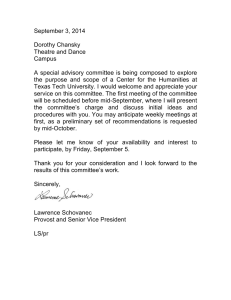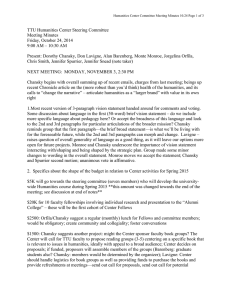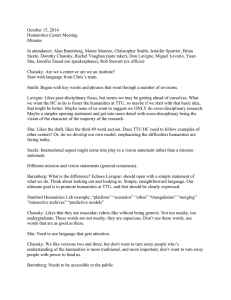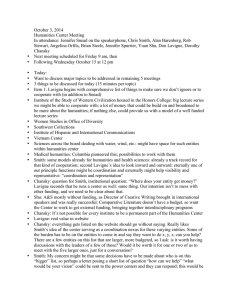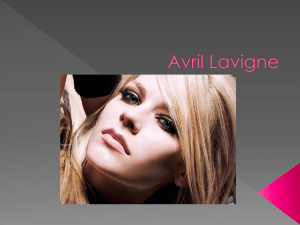Humanities Center Meeting October 10, 2014 Minutes
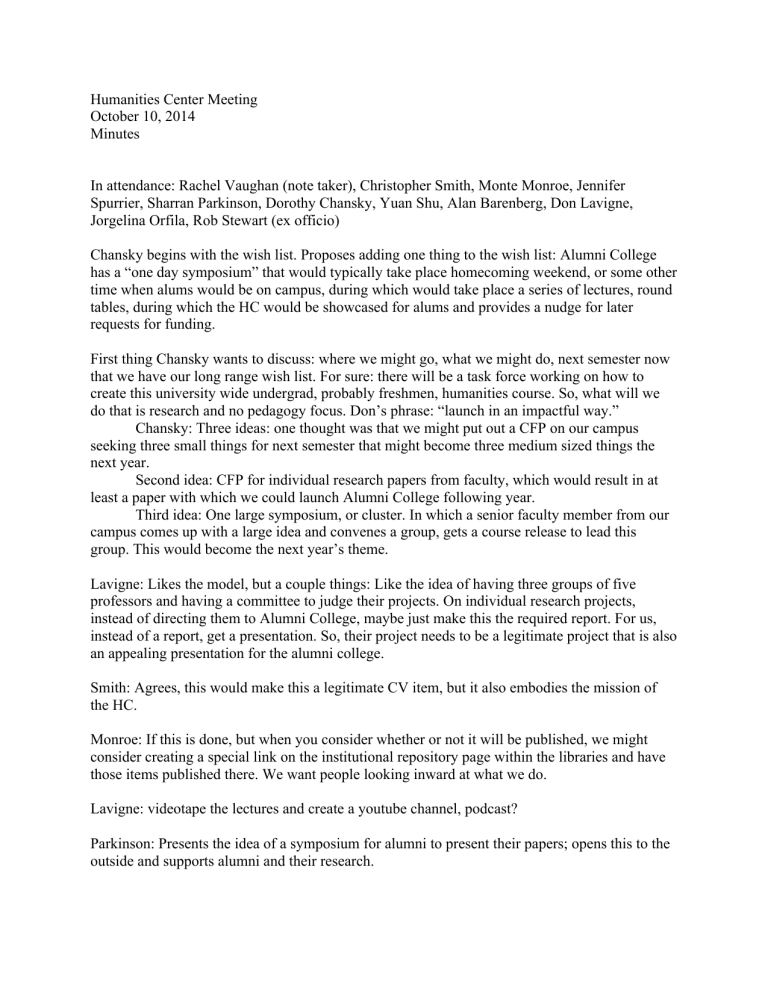
Humanities Center Meeting
October 10, 2014
Minutes
In attendance: Rachel Vaughan (note taker), Christopher Smith, Monte Monroe, Jennifer
Spurrier, Sharran Parkinson, Dorothy Chansky, Yuan Shu, Alan Barenberg, Don Lavigne,
Jorgelina Orfila, Rob Stewart (ex officio)
Chansky begins with the wish list. Proposes adding one thing to the wish list: Alumni College has a “one day symposium” that would typically take place homecoming weekend, or some other time when alums would be on campus, during which would take place a series of lectures, round tables, during which the HC would be showcased for alums and provides a nudge for later requests for funding.
First thing Chansky wants to discuss: where we might go, what we might do, next semester now that we have our long range wish list. For sure: there will be a task force working on how to create this university wide undergrad, probably freshmen, humanities course. So, what will we do that is research and no pedagogy focus. Don’s phrase: “launch in an impactful way.”
Chansky: Three ideas: one thought was that we might put out a CFP on our campus seeking three small things for next semester that might become three medium sized things the next year.
Second idea: CFP for individual research papers from faculty, which would result in at least a paper with which we could launch Alumni College following year.
Third idea: One large symposium, or cluster. In which a senior faculty member from our campus comes up with a large idea and convenes a group, gets a course release to lead this group. This would become the next year’s theme.
Lavigne: Likes the model, but a couple things: Like the idea of having three groups of five professors and having a committee to judge their projects. On individual research projects, instead of directing them to Alumni College, maybe just make this the required report. For us, instead of a report, get a presentation. So, their project needs to be a legitimate project that is also an appealing presentation for the alumni college.
Smith: Agrees, this would make this a legitimate CV item, but it also embodies the mission of the HC.
Monroe: If this is done, but when you consider whether or not it will be published, we might consider creating a special link on the institutional repository page within the libraries and have those items published there. We want people looking inward at what we do.
Lavigne: videotape the lectures and create a youtube channel, podcast?
Parkinson: Presents the idea of a symposium for alumni to present their papers; opens this to the outside and supports alumni and their research.
Monroe: To what degree is something similar, not on the same academic scale, being done through OLLI?
Smith: We wouldn’t have to partnered with OLLI, but realize that they do have a constituency, that we might be able to mimic their model. Suggestion that we make use of social media, of course, go through university portal, yes, alumni college with publishable research, tangible explication of how we could be post-disciplinary. We are saying, hey, we are creating peerreviewed research, but because we are capable of working beyond the bounds of our own departments, we are capable of so much more intellectual work.
Monroe: OLLI are the people with money, and we might be able to use that to our benefit.
Lavigne: Group projects should have some kind of public component.
Orfila: Another view on post-disciplinarity. How do we understand learning and knowledge in the 21 st century? Some of these ideas are also discussing our mission statement to bring in awareness of how the HC is bringing this idea to campus.
Chansky: It’s going to be very important how we word our CFP. From the get-go, projects that we would roll out next semester would already model this. So, come back to next semester: like the idea of funding ten individual project proposals that will result in a public presentation…
Lavigne: an excellent piece of research that we will be required to be presented. The more they correspond to the mission the better, but the individual projects should be a place for them to do what they do. Group projects might be a better place for more cooperation. I know we’ve got this financial target, but I think we should ignore it while we’re planning what we want.
Chanksy: How do we want to think about the ten individual projects?
Lavigne: A thousand each?
Barenberg: Don't think this is the time to be limiting this, but eh point is they want a HC and if they want to be serious, they need to invest a little bit of money. Ask for 3K per fellowship.
Lavigne: Let people have a course reduction and show up at the HC.
Chanksy: We could say, no we can’t even get started without more, OR we’re going to have the hottest start ever, and if you want more we need more money.
Shu: CAHSS grants? (next year, looking too far forward)
Lavigne: what if we give pitches for the spring: try for a thousand, but goal be a course reduction and that will structure the way we write the plan.
Smith: Add one thing: in addition to this money, it MUST include a course reduction. If it’s going to be a center, people must have time.
Barenberg: Agrees, is a structural problem in the university. In the humanities, we need money, yes, but we need time. There’s a certain threshold you have to cross in offering the grants if you want people committed. If you want faculty buy-in, we have to think about the threshold that perhaps has to be crossed. It might mean offering fewer of them.
Chanksy: Question: ball parking at 3000, ten faculty member’s course release is 30,000, but how quickly could people be released from classes for next semester? Maybe we do need to make it cost a little more.
Enthusiastic about individual projects. How may, how much? 10 at $2,000?
Parkinson: 5 for 2000 each
Chansky: not credible for alumni college—won’t result in enough presentations
Smith: Add in the language that in the future it will include a course release. If you want to ramp up the total ask for the subsequent year, either make it a large stipend for the same number of candidates or expand the number of candidates, but in the future it will include a course release.
Lavigne: one last thing on course release, are we saying the idea would be that the people selected in the spring (2015) we would push for course releases for the fall?
Chansky: would there be two semesters worth of people getting course releases?
Smith: In our preliminary ask, be advised that hereafter spring 2015 the proposal will include money AND course releases.
Lavigne: We need to write this into the plan so we can organize it before we might the CFP
Orfila: Who will convince the deans to give the course release?
Chansky: Deans have to sign an acknowledgement that if faculty gets the grant, they must get the course release. HC pay for the course release, or split with deans council?
Lavigne: One more thing that has to do with space: getting the people together will create more post-disciplinarity. Required lunch? Think that having this space and giving a fellowship, making them come to campus and sit and eat lunch with everyone else, will help to create a kind of post disciplinary energy.
Chansky: Going back to the wish list and next semester. Consensus seems to favor this particular initiative: one on pedagogy and research (the 10 individual projects); this means we’ve spent about half the money. So, next question: on wish list, item two is infrastructural support including staff. Who is the staff? Did arithmetic on four proposed staff members, and low-balling each of them 40,000 salary before fringe benefits, director no less than 80,000, so we have a quarter of million in salaries with these four people. Question for today is: do we want next semester to begin with any of these things? Grants, web, or premature?
Lavigne: We should propose this to the VPR. Maybe there’s a way to negotiate some of the salary through that office?
Chansky: Who do we want next semester?
Lavigne: Grant writer not necessary.
Parkinson: Idea of virtual space? Meeting in provost conference room?
Stewart: What we try to pursue for preliminary proposal is what we need immediately to get organized and recognized and things on the ground and running. Much smaller scale than what we’re looking to for the big picture. What will it take for the spring? Can’t say there’s designated space, but a request in the proposal could be a physical location for an individual to get started.
Chansky: Two offices for two people next to each other? (agreement)
Lavigne: Disagrees, and thinks web is most important.
Orfila: Need a director.
Parkinson: Agreement. Maybe use our money to have a chair of the center.
Everyone agrees director first. Money could go for director’s course releases.
Chansky: So we need a “leader.”
Lavigne: But we should still be thinking as a board.
Chansky: Need a continued advisory board/committee present.
Smith: Whoever is serving as “leader,” has to be the person who dedicates the most time and needs the course releases the most. About the language in mission: sent final version to Chansky.
Now out of subcommittee and into general idea.
Next meeting: Next week on Wednesday at noon. Start next time with language, and now far enough down the pike that we could be able to go into the next couple of paragraphs. Two other proposals for next semester and how that might work and the personnel infrastructure. Keep in back of minds that we need to think about who the “second person” would be. Don’t abandon idea of individuals, need to discuss more. Food.
